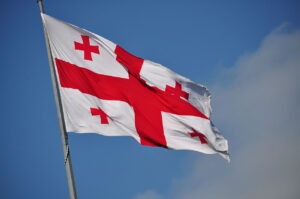View the full report here.

The report outlines seven actions U.S. and EU policymakers should take ahead of the Georgian election:
- While the EU needs unanimity on various sanctions actions, targeted travel bans could be introduced for Georgian Dream leaders who voted for the foreign agents law.
- The U.S. Congress should move forward with legislation to demonstrate accountability for the Georgian Dream government, which continues to message to voters that it has U.S. support, and the U.S. is “bluffing.”
- USG should consider personal and financial sanctions for select Georgian Dream leaders, including Bidzina Ivanishvili, the former Georgian prime minister and founder of the Georgian Dream party.
- EU could consider a pause in visa-free travel for Georgians. Though controversial, several Georgian NGOs argued persuasively to the mission that this action would demonstrate in real terms to voters the consequences of Georgian Dream government actions.
- U.S. and EU aid agencies should support Georgian civil society in non-compliance with the foreign agents law, including offsetting costs of possible fines and legal fees. There should be no mixed messages from the international community about objection to the law and no efforts to support compliance (trainings, etc.).
- Increased financial support to independent media is needed, particularly regional outlets.
- U.S. and EU leaders should publicly articulate serious doubts about the legitimacy of any election process conducted with hampered nonpartisan observation and failed electoral reform.
The report goes on to recommend post-election actions:
- The international community must stand behind the findings from trusted domestic and international observers about the integrity of the elections. The result of Parallel Vote Tabulations (PVTs) and exit polls will also be critical in validating the official Central Election Commission election results.
- The EU and U.S. should invest significantly in post-election observer efforts, including high-level international delegations to monitor developments and demonstrate support for Georgian civil society immediately after election day. The U.S. should consider a bipartisan congressional delegation in the weeks following the elections to bolster Georgian observers, support citizen protestors, and possibly serve as a deterrent against violence and politically motivated arrests and prosecutions.
- If Georgian Dream is victorious – validated by observers – the international community will need to closely monitor the post-election environment, particularly the government’s response to anticipated protests. Another Georgian Dream term is likely to advance the illiberal playbook, further suppression of civil society and adoption of controversial legislation to limit rights, out of compliance with EU reforms. It appears unlikely, though not impossible, that Georgian Dream would secure the two-thirds majority needed to eliminate the political opposition and deny opposition MPs’ their mandates.
- The EU should consider suspending Georgia’s candidate status until reforms are passed in accordance with the candidacy requirements. Council President Charles Michel should consider a return mission to pressure Georgian Dream lawmakers to honor their previous agreements.
- If it hasn’t already, Congress should move forward with legislation on Georgia if Georgian Dream does not remove the foreign agents law and continues forward with anti-human rights legislation (such as LGBTQ restrictions).
- If Georgia continues its autocratic trajectory, the international community will ultimately need to determine: 1) the value of any partnership with an autocratic Georgian government, particularly if the anti-Western rhetoric continues; and 2) whether a Georgian Dream government is a reliable partner (particularly for sharing intelligence or cooperation on anti-terrorism efforts), given links with Russia, as well as China and Iran.
- In the possibility of an opposition victory, the EU and U.S. will no doubt forcefully advocate for the peaceful transfer of power. Any Georgian Dream obstruction would necessitate a permanent cessation of international assistance to and cooperation with the government, sanctions, and revocation of EU candidacy status.
- If the Central Election Commission declares Georgian Dream the winner but observation groups were significantly obstructed or declare serious irregularities rendering the results not credible, international pressure will be essential to ensure a thorough complaints adjudication process, audits, recounts, and a new election, if necessary.
- Regardless of outcome, support to Georgian civil society should be robust, particularly watchdog and independent media organizations. Creative financing avenues, as used in Azerbaijan, may need to be explored if civil society space closes. Lifelines to the Georgian people, who overwhelming support EU and NATO membership, should be continued through civil society engagement and public diplomacy efforts.